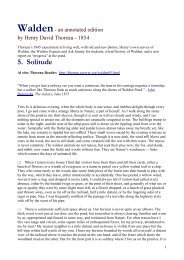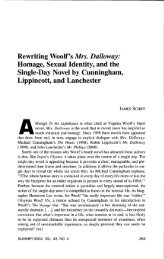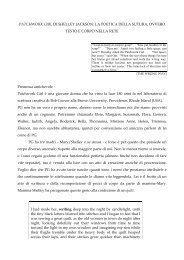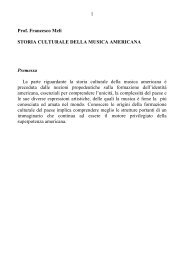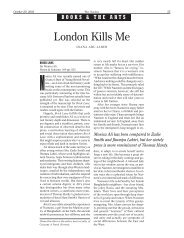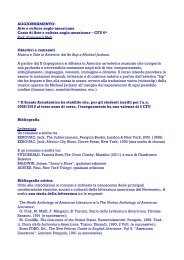Exciting Tales of Exotic Dark India - Paola Carbone
Exciting Tales of Exotic Dark India - Paola Carbone
Exciting Tales of Exotic Dark India - Paola Carbone
You also want an ePaper? Increase the reach of your titles
YUMPU automatically turns print PDFs into web optimized ePapers that Google loves.
<strong>Exciting</strong> <strong>Tales</strong> <strong>of</strong> <strong>Exotic</strong> <strong>Dark</strong> <strong>India</strong> 283<br />
Rushdie’s status as marketable commodity in the literary marketplace.<br />
As Erica Wagner comments in The Times, “it is perhaps fitting” that in<br />
the year when Midnight’s Children was elected “The Best <strong>of</strong> the Booker”<br />
to celebrate the fortieth anniversary <strong>of</strong> the Prize, the winner should<br />
be “a compelling portrait <strong>of</strong> modern <strong>India</strong>, The White Tiger, that takes<br />
his country – and the reader – into the present day, a follow-up to the<br />
moment <strong>of</strong> a country’s conception that Rushdie portrayed”. 30 Likewise,<br />
praising Adiga’s novel as charting a new imaginative territory, Sudipta<br />
Datta asks the writer during a post-Booker win interview to consider<br />
if IWE “has finally shed the Rushdie hangover”. Adiga answers that<br />
he does not believe “it had a hangover”; he adds that authors such as<br />
Kiran Desai, Amitav Ghosh and Rohinton Mistry are not “remotely like<br />
Rushdie” and yet “each is a very great writer”, which demonstrates the<br />
vibrancy and diversity <strong>of</strong> current South Asian writing. 31<br />
Following Richard Todd’s analysis <strong>of</strong> literary texts as market<br />
commodities, the particular process <strong>of</strong> literary canon-formation facilitated<br />
by the Booker Prize is “commercial as well as literary (what’s ‘in’ what’s<br />
everybody reading this season)”. 32 It is necessary, then, to regard the<br />
above critical exchanges as artificial and strategic. Besides, the opposition<br />
between Rushdie and Adiga’s narrative thematics is ill-founded. Rushdie’s<br />
vision <strong>of</strong> <strong>India</strong>, for instance in the short story “The Free Radio” (1994), is<br />
possibly as dark as Adiga’s unremitting satire and gore-and-grime realism<br />
in The White Tiger. “The Free Radio” is the tragic-comic story <strong>of</strong> another<br />
“half-baked” <strong>India</strong>n, Ramani, a naïve rickshaw driver who voluntarily<br />
submits to a vasectomy for the sake <strong>of</strong> his new wife, a widow with five<br />
children, but especially because he believes he will win a transistor radio.<br />
The historical setting <strong>of</strong> the short story is the dark political climate <strong>of</strong><br />
the Emergency declared by Indira Gandhi in 1975 – “the beginning <strong>of</strong><br />
a continuous midnight”, as Rushdie’s narrator Saleem Sinai puts it in<br />
Midnight’s Children. 33 “The Free Radio” particularly exposes the major<br />
nasbandi (sterilization) campaign carried out under the leadership <strong>of</strong><br />
Indira and her son Sanjay Gandhi. Medical personnel had sterilization<br />
quotas to fill, and money or a “brand-new first-class battery-operated<br />
transistor radio” 34 were the incentives <strong>of</strong>fered to those willing to submit<br />
to the procedure. 35 It is in this context that Ramani, a representative <strong>of</strong><br />
the uneducated and economically deprived <strong>India</strong>n underclass, willingly<br />
enters the “big white caravan” <strong>of</strong> the <strong>India</strong>n National Health Service in<br />
exchange for a free radio. 36<br />
After realizing there is no reward, he moves to Bombay in search<br />
<strong>of</strong> Bollywood stardom. Ramani is described by the narrator, a retired<br />
teacher, as “an innocent, a real donkey’s child”, 37 and this innocence is<br />
also political. 38 Through this self-delusional character <strong>of</strong> a rickshaw-wallah,<br />
Rushdie uncovers the naivety <strong>of</strong> those who think that politicians provide<br />
Downloaded from jcl.sagepub.com at Senate House Library, University <strong>of</strong> London on November 29, 2010



